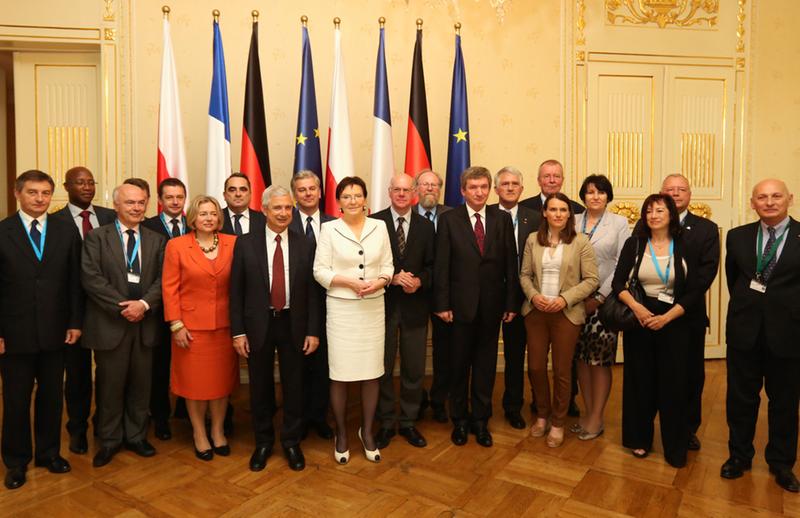 The second trilateral meeting of the Presidiums of the Parliaments of the Weimar Triangle countries (the Presidium of the Polish Sejm, the National Assembly of the French Republic and the German Bundestag) was held in Krakow on July 4-5.
The second trilateral meeting of the Presidiums of the Parliaments of the Weimar Triangle countries (the Presidium of the Polish Sejm, the National Assembly of the French Republic and the German Bundestag) was held in Krakow on July 4-5.
The first meeting took place in the summer of 2010 in Essen, Germany.
- The agenda included the following topics:
The Future of the European Union in the Context of Economic and Monetary Union Reforms
(speakers: Claude Bartolone - France, Wolfgang Thierse - Germany, Jerzy Wenderlich - Poland).
2. common security and defence policy
(speakers: Ruprecht Polenz - Germany, Wanda Nowicka - Poland, Danielle Auroi - France).
European Neighbourhood Policy, Southern Dimension and Eastern Partnership
(speakers: Norbert Lammert - Germany, Cezary Grabarczyk - Poland, Claude Bartolone - France).
Photo: Krzysztof Bialoskórski.
In the first issue Speakers emphasized the need for closer cooperation of EU countries in the face of the crisis and related problems, such as unemployment or youth cooperation, as well as the need to increase the role of national parliaments.
The issues discussed included next stages of integration, common currency (euro) and the fiscal pact. Wolfgang Thierse, Vice President of the Bundestag, drew attention i.a. to the importance of acceptance of the actions undertaken.
In the discussion Marek KuchcińskiAs a representative of the largest opposition party, Deputy Speaker of the Sejm of the Republic of Poland, pointed out that in Poland the approval of the fiscal pact was made by the parliamentary majority of the government in a manner not provided for this type of agreements and in violation of the Constitution (art. 90). Therefore, these issues will be decided by the Constitutional Court.
There is no acceptance for the euro in Poland either - 50% of Poles oppose the introduction of the euro. Marek Kuchcinski also drew attention to the negative opinion on federation aspirations.
There is scepticism on this issue not only in Poland, but also in the Netherlands and Great Britain. According to the Law and Justice party, the European Union should modify the pace and areas of integration. First, there should be a profound review of the progress of integration to date and its compatibility with national constitutions. Such an approach is in line with the expectation of an increased role for national parliaments.
On the Common Security and Defence Policy According to the speakers, there has to be a deepening of cooperation between the EU countries based on the Weimar Plus Declaration, signed on 15 November 2012 by the Ministers of Foreign Affairs and National Defence of Poland, Germany, France, Italy and Spain. This greater involvement should include issues related to, among others, the preparation of EU military operations/missions also due to the US "withdrawal" from areas around Europe (Africa, Middle East).
Deputy Speaker Marek Kuchciński emphasized in the discussionHe said that European defence policy should be built by strengthening the defence of all EU member states, but in the context of cooperation with NATO. He also pointed out that the EU countries should have time to get acquainted with the prepared reports on security and defense and the arms industry.
On the European Neighbourhood Policy Speakers emphasized the complicated situation in the East and South, where elected governments are toppled and the will to reform is not always visible in supported countries (N. Lammert: in the EU we sometimes overestimate our influence on changes in neighboring countries. They must have the right to develop on their own within the framework of generally recognized democratic values. There is a need to create new relations between civil society and the state apparatus).
Cezary Grabarczyk emphasized the achievements of the Eastern Partnership countries, which should be marked by the "more for more" principle accompanying the distribution of financial support. Claude Bartolone proposed the following division of financial support in the coming years: 2/3 for the southern direction, 1/3 for the eastern direction.
In the discussion, Marek Kuchciński notedI believe that the main conclusion of this part of the debate is that the European Neighbourhood Policy is in crisis, as there is no stability either in the East, the Caucasus or the South. The EU should present Georgia, Moldova and Ukraine with a concrete membership perspective as soon as possible.
If this does not happen, we will lose these countries and societies. He suggested returning to the foundations of European solidarity - understood as the ability to share one's wealth with those who need it most, especially the eastern nations that survived the communist era.
He also pointed out the big difference in funding between the Eastern Partnership and the Southern direction: for the EaP (six countries) in 2012 the EU allocated 600 million euros of support, and for Turkey alone 800 million, although Turkey is not technically part of the Neighborhood Policy, but a candidate country.
Another example of the imbalance of support in the Neighborhood Policy is the loan limits: up to 150 million euros were allocated for the East, but up to 1 billion euros for the South, where these funds were largely lost (Egypt, Libya, Syria).
He also proposed that one of the instruments strengthening the Eastern Partnership should be the Carpathian Strategy as an element of coordination of cooperation between the Carpathian countries, among which is Ukraine.
The next meeting of the authorities of the Weimar Triangle parliaments is planned in three years in France.


